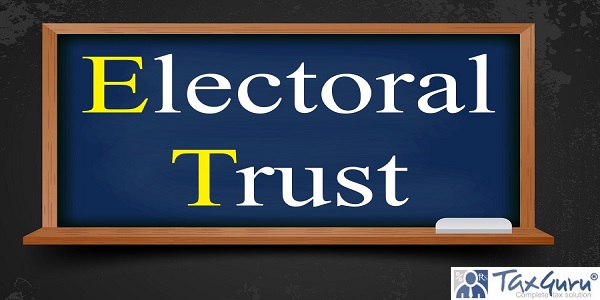As per Section 17CA of Income Tax Rules (1962), an Electoral Trust (ET) is a non-profit organization established for orderly receipts of voluntary contributions from any person for distributing the same to political parties, registered under Section 29A of the Representation of People Act, 1951.
Objective of Electoral Trust
Electoral Trusts are designed to bring in more transparency in the funds provided by corporate entities to the political parties. The objective of an Electoral trust is not to receive any profit or pass on any direct or indirect benefit to its members or contributors. An Electoral trust will distribute funds only to eligible Political party. These trusts are approved by Central Board of Direct Taxes (CBDT) in accordance with the Electoral Trust Scheme of 2013.

Contributions to Electoral Trust
The ET may receive voluntary contributions from:
> an Individual (citizen of India)
> a Company registered in India
> a Firm or HUF or Associations of Persons or Body of Individuals resident in India
The ET shall accept contributions only by way of an account payee cheque/bank draft/electronic transfer to its bank account. It shall not accept any contributions in the form of cash. The ET shall be issuing a receipt immediately on receipt of any contribution. The ET shall not accept any contributions without PAN of the contributor who is a resident and passport number in the case of a citizen of India, who is not a resident.
The ET shall not accept voluntary contributions from:
> an Individual who is not a citizen of India
> any Foreign entity whether incorporated or not
> from any other electoral trust which has been registered as a company under Sec 25 of Companies Act, 1956 and approved as an electoral trust
> from a Government company as defined in section 2 of Companies Act, 2013
> from a foreign source as defined in section 2 Foreign Contribution Regulation Act, 2010
Deductions/Exemptions
> Corporate Donors can claim deduction under Section 80GGB for amount of donation made to political parties.
> Other persons (except local authority and artificial juridical person funded by Government) can claim deduction under Section 80GGC
> Any voluntary contributions received by ET are exempt under Section 13B of the Income Tax Act, 1961 provided the trust distributes 95% of the aggregate donations received and previous year surplus if any to eligible political parties and functions in accordance with the rules made by Central Government.
Major Functions of Electoral Trust
> ET for the purpose of managing its affairs may spend upto 5% of the total contributions received in a year subject to a maximum limit of INR 5 Lakhs in the first year of incorporation and INR 3 Lakhs in subsequent years.
> The distributable contributions for the financial year will be the total contributions received by ET in any financial year along with the surplus from earlier financial years (if any) post reduction of the amount spent on managing its affairs.
> The ET shall be required to distribute the distributable contributions received in a financial year to the eligible political parties before 31st March of the said financial year, subject to the condition that at least 95% of the total contributions received during the financial year along with the surplus brought forward from earlier financial year (if any) are distributed.
> ET shall obtain a receipt from eligible political party indicating the name of the party, its PAN, registration number, amount of fund received from the trust, date of receipt and designation of the person signing the receipt.
> ET shall keep and maintain books of account and other documents in respect of its receipts, distributions and expenditure as may enable the computation of its total income in accordance with the provisions of the Act.
> ET shall also maintain a list of persons from whom contributions have been received and to whom the same has been distributed, containing the name, address and PAN number of each such person along with the details of amount and mode of its payment including the name and branch of the bank.
> Every ET shall get its accounts audited by an accountant as defined in the sub section (2) of section 288 and furnish the audit report in Form No 10BC along with particulars forming part of its annexure to the Commissioner of Income Tax or the Director of Income Tax on or before the due date specified for furnishing the return of income by a company under Section 139.
> ET shall maintain a regular record of proceedings of all meetings and decisions taken.
> Every ET shall furnish a certified copy of list of political parties, to whom sums were distributed to the Commissioner of Income Tax or the director of Income Tax every year along with audit report.
> Any change in shareholders, subsequent to the approval granted under Electoral Trust Scheme, 2013 shall be intimated to the Board within 30 days of such change.
About the Author
Author is Ru chika Bhagat, FCA helping foreign companies in setting up and closure of business in India and complying with various tax laws applicable to foreign companies while establishing a business in India. Neeraj Bhagat & Co. Chartered Accountants, is a well-established Chartered Accountancy firm founded in the year 1997 with its head office at New Delhi.
chika Bhagat, FCA helping foreign companies in setting up and closure of business in India and complying with various tax laws applicable to foreign companies while establishing a business in India. Neeraj Bhagat & Co. Chartered Accountants, is a well-established Chartered Accountancy firm founded in the year 1997 with its head office at New Delhi.





